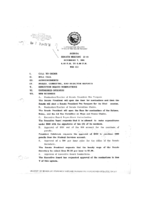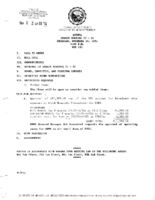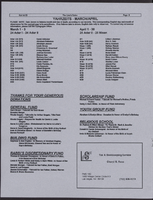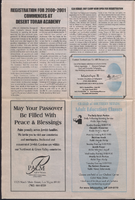Search the Special Collections and Archives Portal
Search Results

Meeting minutes for Consolidated Student Senate University of Nevada, Las Vegas, November 7, 1991
Date
Archival Collection
Description
Text

Meeting minutes for Consolidated Student Senate University of Nevada, Las Vegas, November 14, 1991
Date
Archival Collection
Description
Text

José Luis Meléndrez oral history interview: transcript
Date
Archival Collection
Description
Oral history interview with José Luis Meléndrez conducted by Laurents Bañuelos-Benitez on November 20, 2018 for the Latinx Voices of Southern Nevada Oral History Project. In this interview, Meléndrez discusses his family background and early life in Baja California. He talks about his father's decision to migrate to the United States, and attending Catholic schools in California, Nevada, and Texas as the family moved around the country. Meléndrez recalls moving to Las Vegas, Nevada in 1990, enrolling at the University of Nevada, Las Vegas (UNLV), and his involvement with the Boy Scouts of America affiliated program, Learning for Life. Later, Meléndrez describes attending the University of Michigan, earning a master's degree in social work, and becoming executive director for the office of Community Partnerships in the UNLV School of Public Health. Lastly, Meléndrez discusses the future of the Las Vegas Latinx community, and becoming a founding member and chair for the Nevada Minority Health and Equity Coalition.
Text

June Monroe and Kazuko Atomura oral history interview: transcripts
Date
Archival Collection
Description
Oral history interviews with June Monroe and Kazuko Atomura conducted by Cecilia Winchell and Stefani Evans on July 14 and July 19, 2022 for Reflections: the Las Vegas Asian American and Pacific Islander Oral History Project. In the first interview, Kazuko Atomura describes her childhood in Taiwan and Tokyo, Japan, and shares both happy and difficult mememories of that time. Atomura eventually moved to Los Angeles, California, where she reconnected with a man she previously met in Japan. She married him and together had their daughter, June Monroe, and another son while living in Corpus Christi, Texas. After difficult medical procedures involving Atomura's husband and Monroe's younger brother, Brian, the family relocated to Las Vegas, Nevada. Monroe recalls attending Las Vegas High School and Bonanza High School, and the struggle of making new friends as a young person. In the second interview, the mother and daughter discuss racism, discrimination, and identity. Kazuko Atomura recalls her many experiences with discrimination as a result of both her appearance and language barriers. June Monroe discusses how she came to be proud of her Japanese heritage, while Atomura discusses some of the community activities she has been involved in since living in Las Vegas including the Japanese Culture Club and odori dancing. Then, both Atomura and Monroe discuss Monroe's brother, Brian, who received two kidney transplants; one from Monroe's father and one from Monroe herself. Atomura talks about the shrines she has built for Brian, the experience of him being on dialysis, care taking, and his final days. Monroe shares about her activism with organ donation, being regularly involved with the Nevada Donor Network and helping to pass significant pieces of legislation within the area of organ donation.
Text
Elizabeth von Till and Claude N. Warren Professional Papers
Identifier
Abstract
The Elizabeth von Till and Claude N. Warren Professional Papers (1916-2021) are comprised of the personal and professional papers of anthropologist Claude N. Warren and historical preservationist Elizabth von Till Warren. The materials in this collection primarily consist of research files, maps, and drawings on various archaeological and historical preservation projects in southern Nevada of which they both were involved. This collection includes field notes and surveys from archaeological projects such as the Old Las Vegas Mormon Fort and the Las Vegas Springs Preserve. Records on von Till Warren's involvement with the Old Spanish Trail Association, Southern Nevada Historical Society, and historic preservation work around southern Nevada are represented. Also included are Robert H. Crabtree's archaeological research files, a colleague of Claude Warren who bequeathed his professional files to him upon his death.
Archival Collection

Nora Mirabal interview, August 30, 2019: transcript
Date
Archival Collection
Description
Interviewed by Elsa Lopez and Barbara Tabach. Cuban refugee family by way of Spain and then to the US; arrived in Las Vegas in 1973 when Nora was 9 years old. Struggled in youth but rises up as embraces educaton. Currently is Assistant Director of Academic Partnership at CSN.
Text

Transcript of interview with Flo Mlynarczyk by Claytee White, July 7, 2005
Date
Archival Collection
Description
Flo Mlynarczyk began life in Fort Morgan, Colorado. Her parents divorced and she moved with her mother first to Loveland and eventually to Los Angeles. Her mother started the first Red Cross in Bell Gardens, oversaw the building of their home, and raised money for various charities. Flo remembers when the Japanese were rounded up and interred during WWII. She was in grade school and recalls that one day they all just disappeared. Upon graduation from high school in 1943, Flo moved to Kodiak, Alaska, to live with friends. She recalls total blackouts on the streets of Kodiak due to the war, the Short Snorter Club, and her return to California after a bout of pneumonia. Back in Bell Gardens, Flo worked for a department store, married and divorced in 1945, gave birth to her son Michael in 1946, and ended up in Tonopah, Nevada, with a sister who ran a cafe there. After a second marriage ended, Flo moved to Las Vegas and began working at Phelps Pump and Equipment as a bookkeeper.
Text



